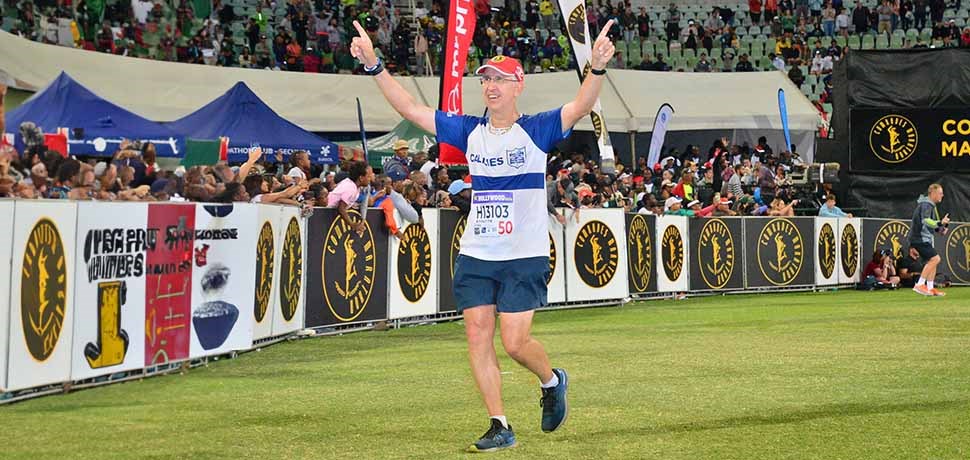Craig Pheiffer’s Comrades journey is a story of perseverance
Craig Pheiffer started running Comrades in 1992. Since then, he’s run ten Comrades, successfully finishing 5. He shares his story of perseverance and why he keeps going back.

Craig Pheiffer wasn’t always a runner. In fact, when he was in the army doing his national service, he despised running. “I was always the guy at the back of the pack they were waiting for,” he recalls. It was only after he quit smoking and picked up weight that he decided to start running and found, much to his surprise, that he enjoyed it.
Craig did his first race in 1991. “There was a 5km and a 10km run. It was a double loop so I thought let me do the 5km and if I’m feeling good, I could just carry on and go around again and do the 10km.” Which is exactly what he did – “It was fantastic. I got a medal. I loved it.” The running bug had hit and two months later he did a 15km followed by a half marathon.
That same year he was at his father-in-law’s house watching the Comrades Marathon when his father-in-law said to him “you will never do this.” Craig took the bait and they made a bet that if he managed to finish Comrades his father-in-law would give him R1,000 and he would pay for his race accommodation.
The next year in 1992, Craig won the bet, completing his first Comrades in 10 hours and 43 minutes. “I was completely broken after that but had a very happy heart.” Soon afterwards he developed a running injury, the result of going “too hard, too fast, too soon.” He tried everything from rest to physio, acupuncture, and even cortisone injections to heal. His last attempt was a surgery where they cut the tendon on the side of his knee to release it. It proved successful and he was able to resume running again.
By 2010 he was ready to return to the Comrades Marathon. He finished with just five minutes to spare in 11 hours and 55 minutes, “I was ecstatic. I didn’t ever think that I could do it again. To build up again, get past the injury, and 18 years after the first one that was very special. I was very emotional when I crossed the finish line.”
He came back in 2011 but only got as far as 75km due to an injury. Not discouraged, he returned in 2012, finishing the race and getting his third medal. His next four Comrades attempts were unsuccessful. Looking back he says these failures were hard to swallow. “You run with a running club and everyone else is finishing the race. Your friends are making it, getting their medals. Their tally keeps growing, and yours isn’t going anywhere.” However, he says it taught him never to give up on something he wanted to do. “It's not about the failure. Failure is part of learning – you get to do things better. You get knocked down, but you get up and try again.”
Failure is part of learning – you get to do things better.
For Craig, race day is a mental game – overcoming the pain and persevering through the bad patches. “You know that bad patch will pass. You just need to keep putting one step in front of the other, keep heading in the direction of the finish and not quitting.” This is an attitude he’s had on every single run – never stopping until a cut-off forced him to.
One of the things he has learnt is the importance of strength training for runners. “That’s what helps you down those hills,” he says, “your legs take an absolute jarring, but it’s the strength training that carries you through.”
During COVID-19, Craig worked on his fitness and by the time the run returned in 2022, he was ready to give it another go. “I completed that in 11 hours, 57 minutes and 22 seconds. They were playing the final countdown as I was entering the stadium. I was overjoyed.”
Much to his wife’s and daughter’s dismay, “they’re the ones who really take all the strain while they’re waiting for you at the end,” he signed up again this year. He was the 10th last person to cross the finish line in a time of 11 hours, 57 minutes and 54 seconds. Crossing the finish time with barely time to spare makes for a particularly emotional finish Craig says. “You don’t know the whole day whether you’re going to make it or not. It’s quite emotional and special when you get into that stadium and all the crowds are cheering for you, particularly this year when there was hardly anybody on the field.”
As for future Comrades, Craig is not done. He’d like to return next year and has his eye on the 100th run, taking place in 2027. Doing Comrades, he shares, is about having a goal, working towards it, and testing your own personal limits. “It’s putting yourself to the test and seeing if you can achieve this massive, almost insurmountable obstacle. You're testing yourself, your perseverance, and your mental fortitude. To come out the other side with that medal, it doesn't matter to me what the colour of the medal is. Only a small handful of people actually get it done and it's an accomplishment.”
An accomplishment Craig says anybody can do if they want – ”You see in the race people of all shapes, sizes, lengths. Anybody can do it – I'm anybody. You have to do the training, but you can do it.”
Well done, Craig!